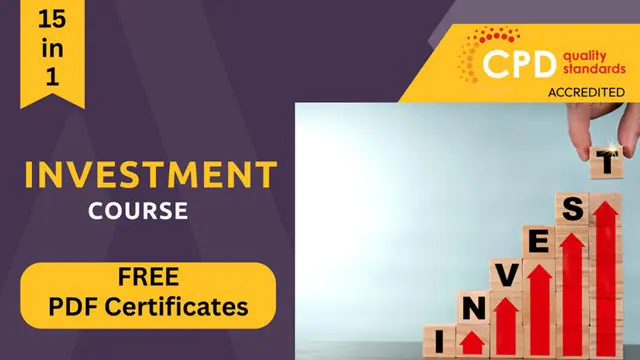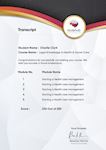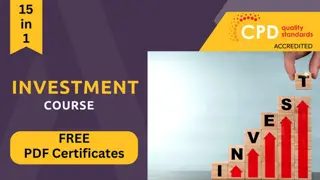
Introduction to Investment Level 3 : Anlysing Risks & Finances
Flash Sale : Enjoy 24% Off | 15 in 1 Exclusive Bundle | PDF Certificate, Transcript, Student ID & Exam Included
StudyHub
Summary
- Certificate of completion - Free
- Exam(s) / assessment(s) is included in price
- Tutor is available to students
Add to basket or enquire
Overview
24 Hour Flash Deal **15-in-1 Mega Bundle**
►►► Enrolment Gifts ◄◄◄ **FREE PDF Certificate**FREE PDF Transcript ** FREE Exam** FREE Student ID ** Lifetime Access **FREE Enrolment Letter **
Investment is a crucial component of financial planning that has the potential to secure your future. The Investment: Analysing Risks & Finances course is a comprehensive course designed to provide you with a detailed understanding of the different types and techniques of investment, key concepts in investment, and risk and portfolio management.
Whether you're looking to invest in the stock market or the bond market, this course will equip you with the knowledge you need to make informed investment decisions. You'll learn how to analyse the risks associated with different types of investments, and how to manage those risks to maximise your returns.
Learning Outcomes:
- Understand the different types and techniques of investment
- Learn key investment concepts and terminologies
- Analyse the risks associated with different types of investments
- Develop strategies for managing risk and maximising returns
- Gain knowledge of the bond and stock market
This Investment Bundle consists of the following career-oriented courses:
- Course 01: Investment
- Course 02: Economics
- Course 03: Business Analysis Strategy and Evaluation
- Course 04: Investment Banking
- Course 05: Forex Scalping Strategy Course
- Course 06: Stock Trading: Technical Analysis, Risks & Frauds
- Course 07: Trading and Financing: Candlestick Pattern
- Course 08: Stakeholder Management
- Course 09: Financial Advisor
- Course 10: Financial Analysis Methods
- Course 11: Budget Analysis and Financial Report Building
- Course 12: Microsoft Excel & Accounting Training
- Course 13: Business Law
- Course 14: Personal Financial Management & Wellness
- Course 15: Decision Making and Critical Thinking Online Course
The Investment Bundle has been prepared by focusing largely on career readiness.
Why Choose Our Course?
- Step-by-step lessons
- One-to-one assistance from professionals if you need it
- Innovative exams to test your knowledge after the course
- 24/7 customer support should you encounter any hiccups
- Unlimited lifetime access to all 15 courses
- Digital Certificate, Transcript and student ID are all included in the price
Certification
Following your completion of the course materials, you will be able to take an assignment test to assess your knowledge. You will be able to grab the PDF certificates & transcripts for free after passing the test. Original Hard Copy certificates must be bought separately for an extra £8.
Certificates
Certificate of completion
Digital certificate - Included
CPD
Course media
Description
This Bundle resources were created with the help of industry experts, and all subject-related information is kept updated on a regular basis to avoid learners from falling behind on the latest developments.
Course Curriculum
**Investment**
- Module 01: Introduction to Investment
- Module 02: Types and Techniques of Investment
- Module 03: Key Concepts in Investment
- Module 04: Understanding the Finance
- Module 05: Investing in Bond Market
- Module 06: Investing in Stock Market
- Module 07: Risk and Portfolio Management
**Economics**
Module 01: An Introduction to Economics
- : Basic Definitions to Start With
- Factors of Production
- Categories of Economics
- Production Possibilities Frontier Framework
- Law of Increasing Opportunity Costs
- A Budget Line
Module 02: The Market System and the Circular Flow Model
- The Market System
- Characteristics of the Market System
- The “Invisible Hand”
- The Circular Flow Model
Module 03: Supply, Demand and Prices
- What Is Demand?
- The Demand Curve
- Individual Demand Curve vs Market Demand Curve
- Factors Causing the Demand Curve to Shift
- What Is Supply?
- The Law of Supply
- Factors Causing the Supply Curve to Shift
- A Change in Supply vs a Change in Quantity Supplied
- A Few Important Terms Related to Supply and Demand
- Equilibrium Price and Quantity
- Equilibrium in Terms of Consumers’ and Producers’ Surplus
Module 04: Prices
- Two Major Jobs of Price
- Price Controls
- Effects of Price Ceiling
- Effects of a Price Floor
- Absolute Price and Relative Price
Module 05: Elasticity
- Introduction to Elasticity
- Price Elasticity of Demand
- The formula for Calculating Price Elasticity of Demand
- From Perfectly Elastic to Perfectly Inelastic Demand
- Price Elasticity of Demand and Total Revenue
- Determinants of Price Elasticity of Demand
- Applications of Price Elasticity of Demand
- Cross Elasticity of Demand
- Income Elasticity of Demand
- Price Elasticity of Supply
- Price Elasticity of Supply and Time
Module 06: Market Failures
- Market Failures in Competitive Markets
- Demand-Side Market Failures
- Supply-Side Market Failures
- Efficiently Functioning Markets
- Public Goods
- Externalities
- Internalising Externalities
- Asymmetric Information
- Government’s Role in the Economy
Module 07: Production and Costs
- The Market and the Firm
- Two Sides to Every Business Firm
- Explicit and Implicit Cost
- Accounting Profit vs Economic Profit
- Zero Economic Profit
- Production
- Long Run vs Short Run
- Production in the Short Run
- Some Economic Cost Concepts
- Average Productivity
- Costs of Production: Total, Average, Marginal
- Economics: Sunk Cost
- Economics: Economies of Scale, Diseconomies of Scale and Constant Returns to Scale
Module 08: Market Structure: Perfect Competition vs Monopoly
- The Theory of Perfect Competition
- Demand Curve for a Perfectly Competitive Firm
- Marginal Revenue Curve of a Perfectly Competitive Firm
- Profit Maximization in the Short Run
- To Produce or Not to Produce
- The Theory of Monopoly
- Barriers to Entry
- The Monopolist’s Demand and Marginal Revenue
- Perfect Competition vs Monopoly
- Price Discrimination
Module 09: Money, Banking and the Financial System
- The Meaning of Money
- Functions of Money
- Defining the Money Supply
- Commercial Banks
- Central Bank
- The Bank’s Balance Sheet
- The Financial System
Module 10: Measuring GDP and Economic Growth
- GDP Defined
- The Circular Flow of Expenditure and Income Revisited
- GDP Equals Expenditure Equals Income
- Measuring UK GDP
- Nominal GDP and Real GDP
- Computing Real GDP
- Limitations of Real GDP
- Economic Growth
Module 11: Unemployment
- Why Unemployment Is a Problem
- Who Are the Unemployed?
Module 12: Inflation
- The Price Level
- Why Inflation and Deflation Are Problems?
Module 13: Income Distribution and Poverty
- Economic Inequality
- Measuring Income Equality
Module 14: International Finance
- The Foreign Exchange Market
- Appreciation and Depreciation of Exchange Rates
Module 15: Fiscal Policy
- Meaning of Budget
- Income Tax Structures
Who is this course for?
This course is suitable for —
- Students
- Recent graduates
- Job Seekers
Progression -
- CISI Level 3 Certificate for Introduction to Securities & Investment
- CISI International Introduction to Investment
- Chartered Institute for Securities and Investment
Requirements
There is no formal qualification needed for this Investment course.
Career path
Investment analysis and management is a highly lucrative field. After completing the Investment: Analysing Risks & Finances course, you can pursue a range of careers such as:
- Investment Analyst
- Financial Planner
- Portfolio Manager
- Wealth Management Advisor
- Risk Manager
Questions and answers
Currently there are no Q&As for this course. Be the first to ask a question.
Reviews
Currently there are no reviews for this course. Be the first to leave a review.
Legal information
This course is advertised on reed.co.uk by the Course Provider, whose terms and conditions apply. Purchases are made directly from the Course Provider, and as such, content and materials are supplied by the Course Provider directly. Reed is acting as agent and not reseller in relation to this course. Reed's only responsibility is to facilitate your payment for the course. It is your responsibility to review and agree to the Course Provider's terms and conditions and satisfy yourself as to the suitability of the course you intend to purchase. Reed will not have any responsibility for the content of the course and/or associated materials.






